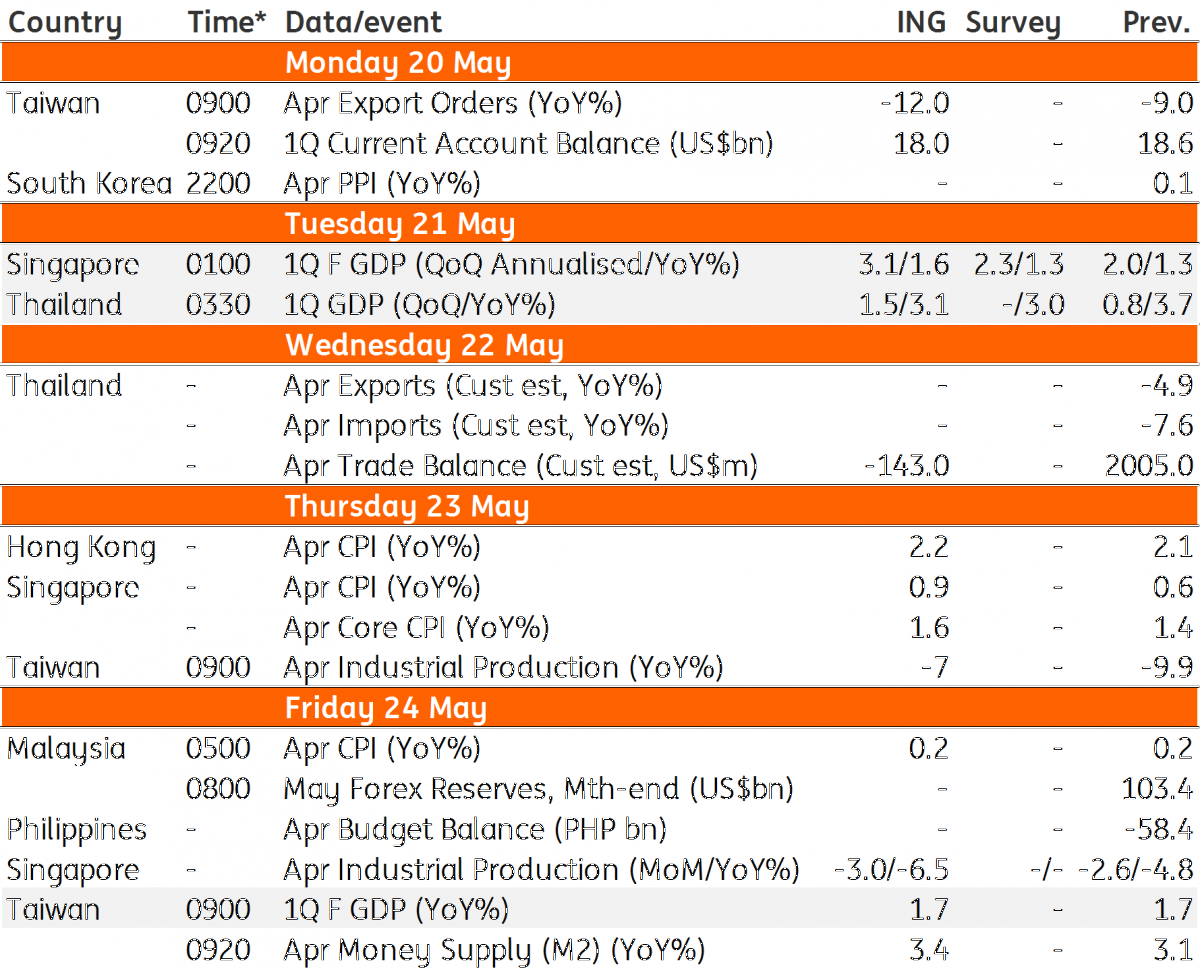Asia week ahead: Politics over economics
Australia goes to the polls over the weekend, while an end to long-standing political uncertainty in India, Indonesia, and Thailand finally seems around the corner. GDP, manufacturing, and inflation data dominate the economic space
Australia goes to the polls
The Federal elections are scheduled on 18 May, with results to be made public in the evening on the same day or early morning the following day.
The pro-incumbent wave seems stronger elsewhere and probably in Australia too. The ruling minority coalition of prime minister Morrison is seen leading in the latest opinion polls. With the current lacklustre economic backdrop, the hopes for the incumbent leader rest on long-term tax reforms, while the opposition Labor Party focuses on issues about education and healthcare.
We expect the lifting of political uncertainty next week to pave the way for the Reserve Bank of Australia's policy rate cut at the June meeting.
Indian voters’ verdict on Modi arrives
The seventh and final phase of Indian general elections takes place over the weekend (19 May). The counting of votes of all phases is scheduled on 23 May, and the results are expected to be out on the same day.
We continue to consider this a close-to-call election, though our baseline remains one of the Modi administration clinging on to the power for the second term. Indeed, the recent opinion polls point to the Modi’s National Democratic Alliance winning by a thin margin. We believe the markets also are priced in for such an outcome. The outperformance of Indian markets and the currency (INR) since February, after the terror attack in Kashmir and the nationalistic sentiment fuelled by the government’s handling of the same, reflects increased investor confidence of the incumbent staying in power.
However, judging from anti-incumbent sentiments that swept through last year’s state-level elections (Chattisgarh, Madhya Pradesh, and Rajasthan) there remains a potential for election surprises.
Jokowi is leading in Indonesia
With 86% of votes of the Presidential Election held on 17 April counted, incumbent Joko Widodo (Jokowi) is running ahead of his rival Prabowo Subianto. The counting is due to be complete by Wednesday, 22 May, and Jokowi is widely expected to continue for the second term - the most market-friendly outcome, or one less thing for investors to be worried about amid rising external uncertainty.
Thai parliament may endorse Prayuth
Thailand’s newly elected parliament will be convened on Wednesday, 22 May, to elect the new prime minister. Incumbent prime minister Prayuth Chan-Ocha stands a high chance of retaining that post with strong backing from the Senate. This week the King approved the new Senate comprising all 250 appointees from military cadre. As for the 500 members lower house of parliament, for which the election was held on 24 March, the Junta-backed party of incumbent prime minister Prayuth Chan-Ocha emerged as a dominant party and is set to form a coalition government with 256 seats in the lower house.
We think the political uncertainty in Thailand is largely over and the focus will be back on the economy. There is just enough on the calendar next week – GDP report for 1Q19 and car sales and external trade data for April. The high-frequency economic data for 1Q19 supports our forecast of a sharp slowdown in GDP growth to 3.1% from 3.7% in 4Q18. This combined with heightened trade tension will make it increasingly hard for the Bank of Thailand to sustain its hawkish rhetoric going forward. Indeed, we are reviewing our on-hold forecast for the BoT policy this year.
And leftover focus on economics
1Q GDP releases also are due in Japan, Singapore, and Taiwan. As for Japan, the macro story hasn’t been any good, which is what backing the consensus view of a GDP contraction in the last quarter. With inflation nowhere close to the Bank of Japan’s policy target, the negative rate policy has a longer life than the central bank’s guidance of this state of affair changing for good by Spring of 2020.
Singapore's and Taiwan's GDP data are the revised figures. Instead, the markets will pay attention to their April manufacturing releases to gauge GDP performance in the second quarter. Reeling under the tech downturn and escalation of the US-China trade war, things aren’t looking any promising for these heavy export-dependent economies.
Needless to say, the balance of economic risk around the region remains tilted toward growth, not toward inflation as a slew of April consumer price figures are expected to reinforce next week.
Asia Economic Calendar

This publication has been prepared by ING solely for information purposes irrespective of a particular user's means, financial situation or investment objectives. The information does not constitute investment recommendation, and nor is it investment, legal or tax advice or an offer or solicitation to purchase or sell any financial instrument. Read more
Download
Download article
17 May 2019
What’s happening in Australia and around the world? This bundle contains 6 Articles
